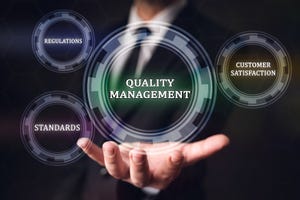Should Device Reps Gird For Tough Times Ahead?
A focus on cost containment and the availability of new technologies may make the job of the device sales rep more tough in the future.
March 11, 2015

A focus on cost containment and the availability of new technologies may make the job of the device sales rep tougher in the future.
Arundhati Parmar
Consolidation in the medtech market is likely to have an effect on jobs of sales reps as combined companies look for synergies and reduce overlapping skill sets.
But another development may make the job of the manufacturer's rep - those with more technical expertise - much harder in the future.
Some hospitals and health systems are considering going rep-less to reduce costs in the operating room for implant surgeries, according to Dotmed Daily News.
This is not going to be easy given the historically close relationship between surgeons and sales reps, but the move to value-based healthcare and the emphasis on cost reduction may well see health sytems take on this cost-containment strategy.
As the article notes, it is estimated that " as much as 40 percent of premium-priced orthopedic implant costs are sales costs — associated with the actual sale rather than with the value of the device."
Hospitals are looking to replace some of the technical expertise that a manufacturer's rep can bring to the operating room by training surgical first assistants. And they are also looking to use FDA-cleared cheaper devices that don't have the bells and whistles of a complex implant made by major device vendors but are similar in terms of clinical outcomes for patients.
While hospitals are looking at ways to contain costs by going rep-less, new digital technologies can also help decrease reliance on reps in the emergency room. ER care is of course another expensive way to access care.
Take for instance Geneva Healthcare. It has created a software solution by which doctors don't have to wait for the device rep when a patient with an implanted cardiac device shows up in the ER. Typically hospitals and patients who have implanted cardiac devices have to wait several hours for the deviec rep to show up and interrogate the device and get the data.
But Geneva Healthcare's software solution can pull data from the cloud and the device's programmer directly into the electronic medical record, and interpret the results for the busy ER physician. It's no small feat given that the different cardiac devices - from the likes of Medtronic, Boston Scientific, St. Jude Medical and Biotronik - collect several hundred physiologic data points and feed it to their respective healthcare cloud environments. Each vendor also presents the data differently.
With this solution hospitals can not only improve their care delivery of ER patients, and potentially operational efficiency as patients aren't kept waiting, they can also bill for reimbursement.
So there appear to be real benefits for hospitals and health systems to reduce their reliance on manufacturers' sales reps.
While these changes won't occur overnight, it's probably not a bad idea for device sales reps to build new skills to remain relevant in the new value-based healthcare paradigm.
Arundhati Parmar is senior editor at MD+DI. Reach her at [email protected] and on Twitter @aparmarbb
[Image Courtesy of iStockphoto.com user arcady_31]
You May Also Like


